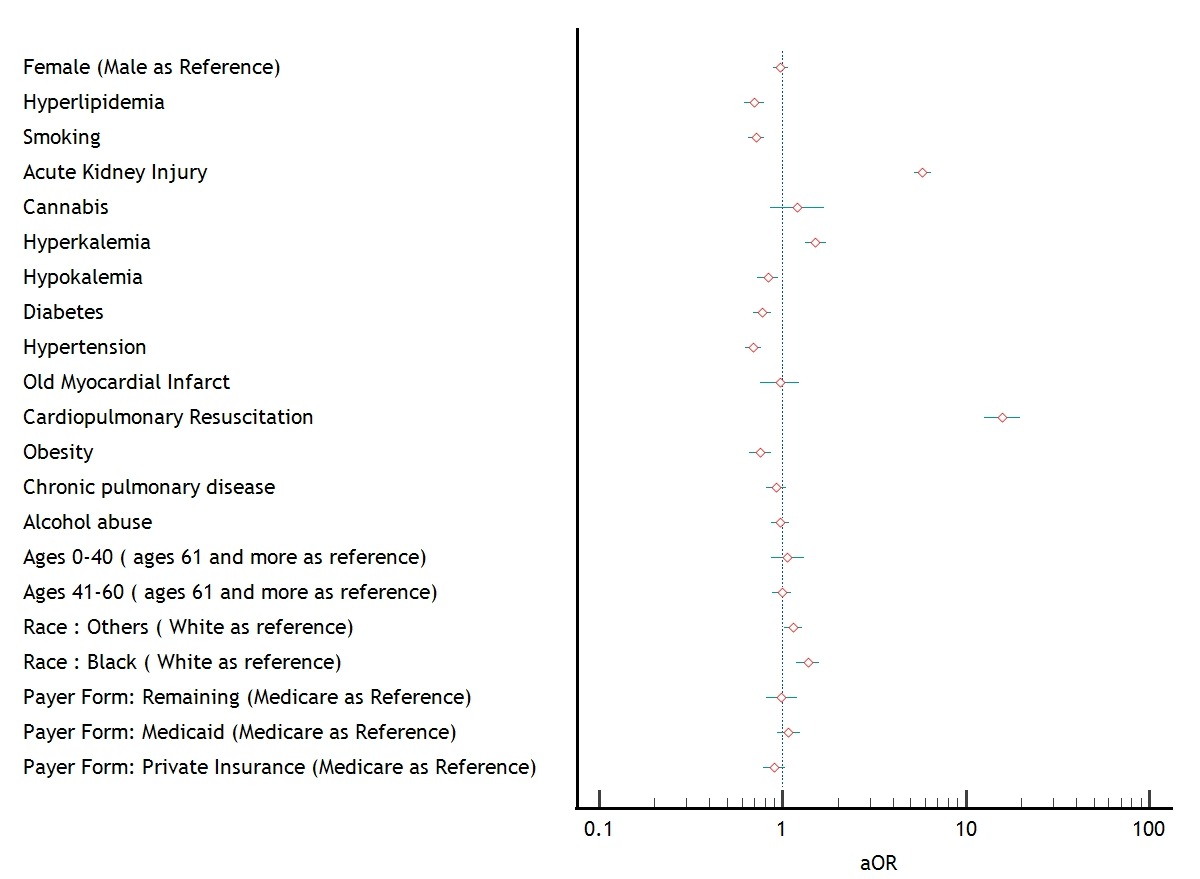Back


Poster Session C - Monday Afternoon
Category: Liver
C0516 - Disparities in Outcomes Among Patients With Cirrhosis and Gastrointestinal Bleeding Undergoing Endoscopy
Monday, October 24, 2022
3:00 PM – 5:00 PM ET
Location: Crown Ballroom

Has Audio

Renuka Verma, MBBS
Guru Gobind Singh Medical College
Newyork, NY
Presenting Author(s)
Renuka Verma, MBBS1, Banreet S. Dhindsa, MD2, Kamleshun Ramphul, MD3, Nomesh Kumar, MD4, Yogeshwaree Ramphul, MD5, Petras Lohana, MD6, Komal Kumari, MBBS7, Arti Lohana, MD8, Davinderbir S. Pannu, MD9, Amaninder Dhaliwal, MD10
1Guru Gobind Singh Medical College, Faridkot, Punjab, India; 2University of Nebraska Medical Center, Omaha, NE; 3Shanghai Jiao Tong University, Shanghai, Shanghai, China; 4Detroit Medical Center, Detroit, MI; 5Sir Seewoosagur National Hospital, Pamplemousses, Pamplemousses, Mauritius; 6Jacobi Medical Center, Bronx, NY; 7Liaquat University of Medical and Health Sciences, Jamshoro, Sindh, Pakistan; 8Medstar Union Memorial Hospital, Baltimore, MD; 9McLeod Health, Florence, SC; 10McLeod Digestive Health Center, Florence, SC
Introduction: Patients with cirrhosis are prone to gastrointestinal (GI) bleeding due to a higher prevalence of varices, and secondary to altered coagulation. The aim of our study is to understand the characteristics of patients with cirrhosis undergoing Endoscopic Treatment (ET) for GI bleeding, and the risk factors associated with mortality.
Methods: We explored the 2019 National Inpatient Sample (NIS) from the Healthcare Cost and Utilization Project, Agency for Healthcare Research and Quality, and their partners (https://www.hcup-us.ahrq.gov/nisoverview.jsp) for cases of cirrhosis with a procedural code for “control bleeding in gastrointestinal tract, endo” (classified under endoscopic control of bleeding) (0W3P8ZZ). Patient characteristics were compared using Chi-Square tests and mortality risks were analyzed via multivariate logistic regression.
Results: 24,635 patients with cirrhosis undergoing ET for GI bleeding were included in our final analysis. These patients were more likely to be males (59.5%), age ≥ 61 (57.5%), White (67.2%), and covered by Medicare (50.8%). 40.4% were smokers, 33.2% had a history of alcohol abuse and 2% reported marijuana use. 38.8% reported Acute Kidney Injury (AKI), 10.6% had hyperkalemia and 17.2% had hypokalemia. Comorbidities- 37.1% had diabetes, 58.5% had hypertension, 18.0% were obese and 20.5% had chronic pulmonary disease.
Our study had mortality rate of 9.4%. After adjusting for variables, AKI (77.3%, aOR 5.799, p< 0.01) and hyperkalemia (19.0%, aOR1.516, p< 0.01) showed increased risk of mortality. Racial differences were also noticed as Blacks (aOR 1.142, p=0.027) had a higher death risk as compared to Caucasians. Cardiopulmonary resuscitation was also linked with a poor outcome (aOR 15.821, p< 0.01). Meanwhile, hyperlipidemia (aOR 0.702, p< 0.01), smoking (0.719, p< 0.01), hypokalemia (aOR 0.831, p< 0.01), diabetes (aOR 0.773, p< 0.01), hypertension (aOR 0.694, p< 0.01), obesity (aOR 0.754, p< 0.01), showed a reduced mortality risk.
Discussion: Our study provides a fresh perspective on various risk factors for mortality among patients with cirrhosis undergoing ET for GI bleeding. Physicians should thus be careful and monitor pre and post-procedural occurrences for timely management to improve the outcomes of these patients.

Disclosures:
Renuka Verma, MBBS1, Banreet S. Dhindsa, MD2, Kamleshun Ramphul, MD3, Nomesh Kumar, MD4, Yogeshwaree Ramphul, MD5, Petras Lohana, MD6, Komal Kumari, MBBS7, Arti Lohana, MD8, Davinderbir S. Pannu, MD9, Amaninder Dhaliwal, MD10. C0516 - Disparities in Outcomes Among Patients With Cirrhosis and Gastrointestinal Bleeding Undergoing Endoscopy, ACG 2022 Annual Scientific Meeting Abstracts. Charlotte, NC: American College of Gastroenterology.
1Guru Gobind Singh Medical College, Faridkot, Punjab, India; 2University of Nebraska Medical Center, Omaha, NE; 3Shanghai Jiao Tong University, Shanghai, Shanghai, China; 4Detroit Medical Center, Detroit, MI; 5Sir Seewoosagur National Hospital, Pamplemousses, Pamplemousses, Mauritius; 6Jacobi Medical Center, Bronx, NY; 7Liaquat University of Medical and Health Sciences, Jamshoro, Sindh, Pakistan; 8Medstar Union Memorial Hospital, Baltimore, MD; 9McLeod Health, Florence, SC; 10McLeod Digestive Health Center, Florence, SC
Introduction: Patients with cirrhosis are prone to gastrointestinal (GI) bleeding due to a higher prevalence of varices, and secondary to altered coagulation. The aim of our study is to understand the characteristics of patients with cirrhosis undergoing Endoscopic Treatment (ET) for GI bleeding, and the risk factors associated with mortality.
Methods: We explored the 2019 National Inpatient Sample (NIS) from the Healthcare Cost and Utilization Project, Agency for Healthcare Research and Quality, and their partners (https://www.hcup-us.ahrq.gov/nisoverview.jsp) for cases of cirrhosis with a procedural code for “control bleeding in gastrointestinal tract, endo” (classified under endoscopic control of bleeding) (0W3P8ZZ). Patient characteristics were compared using Chi-Square tests and mortality risks were analyzed via multivariate logistic regression.
Results: 24,635 patients with cirrhosis undergoing ET for GI bleeding were included in our final analysis. These patients were more likely to be males (59.5%), age ≥ 61 (57.5%), White (67.2%), and covered by Medicare (50.8%). 40.4% were smokers, 33.2% had a history of alcohol abuse and 2% reported marijuana use. 38.8% reported Acute Kidney Injury (AKI), 10.6% had hyperkalemia and 17.2% had hypokalemia. Comorbidities- 37.1% had diabetes, 58.5% had hypertension, 18.0% were obese and 20.5% had chronic pulmonary disease.
Our study had mortality rate of 9.4%. After adjusting for variables, AKI (77.3%, aOR 5.799, p< 0.01) and hyperkalemia (19.0%, aOR1.516, p< 0.01) showed increased risk of mortality. Racial differences were also noticed as Blacks (aOR 1.142, p=0.027) had a higher death risk as compared to Caucasians. Cardiopulmonary resuscitation was also linked with a poor outcome (aOR 15.821, p< 0.01). Meanwhile, hyperlipidemia (aOR 0.702, p< 0.01), smoking (0.719, p< 0.01), hypokalemia (aOR 0.831, p< 0.01), diabetes (aOR 0.773, p< 0.01), hypertension (aOR 0.694, p< 0.01), obesity (aOR 0.754, p< 0.01), showed a reduced mortality risk.
Discussion: Our study provides a fresh perspective on various risk factors for mortality among patients with cirrhosis undergoing ET for GI bleeding. Physicians should thus be careful and monitor pre and post-procedural occurrences for timely management to improve the outcomes of these patients.

Figure: Forest plot showing demographics and risk factors of patients with cirrhosis and GI bleeding
Disclosures:
Renuka Verma indicated no relevant financial relationships.
Banreet Dhindsa indicated no relevant financial relationships.
Kamleshun Ramphul indicated no relevant financial relationships.
Nomesh Kumar indicated no relevant financial relationships.
Yogeshwaree Ramphul indicated no relevant financial relationships.
Petras Lohana indicated no relevant financial relationships.
Komal Kumari indicated no relevant financial relationships.
Arti Lohana indicated no relevant financial relationships.
Davinderbir Pannu indicated no relevant financial relationships.
Amaninder Dhaliwal indicated no relevant financial relationships.
Renuka Verma, MBBS1, Banreet S. Dhindsa, MD2, Kamleshun Ramphul, MD3, Nomesh Kumar, MD4, Yogeshwaree Ramphul, MD5, Petras Lohana, MD6, Komal Kumari, MBBS7, Arti Lohana, MD8, Davinderbir S. Pannu, MD9, Amaninder Dhaliwal, MD10. C0516 - Disparities in Outcomes Among Patients With Cirrhosis and Gastrointestinal Bleeding Undergoing Endoscopy, ACG 2022 Annual Scientific Meeting Abstracts. Charlotte, NC: American College of Gastroenterology.
